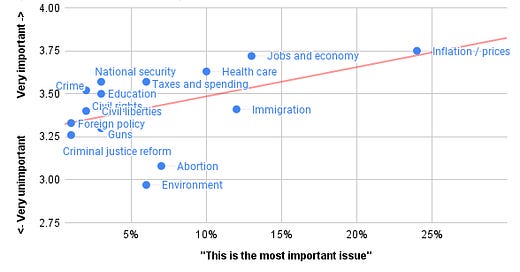Voters are more concerned about the economy than anything
And their concern about the economy is more *intense* than it is about anything else.
Some unusual data analysis this morning that I thought I’d share: periodically, The Economist asks respondents to answer two sets of questions about various issues facing the American public. First, it asks them to say whether they think each of these issues is very important, somewhat important, not very important, or unimportant. This question gives u…
Keep reading with a 7-day free trial
Subscribe to Carl Beijer to keep reading this post and get 7 days of free access to the full post archives.





